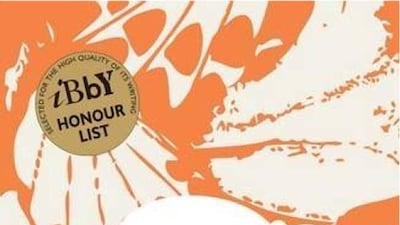The children who populate novels for young readers are often outrageously clever, strikingly observant and extremely competent. They win wars, vanquish villains and do the things we adults cannot.
Not so with the unnamed narrator of Ahlam Bsharat's Code Name: Butterfly, shortlisted for the 2013 Etisalat Prize for Arabic Children's Literature, and now translated by Nancy Roberts.
“Butterfly” is a teen struggling to grow up in a Palestinian village dogged by deaths, arrests and demolitions. The book opens as her father comes home from work, exhausted and snappish, and she doesn’t know what to think about him. Butterfly’s father is no hero: he works on farms owned by Israeli settlers. Is her father wrong to enjoy this work? Is she wrong to eat the chocolates given by his bosses?
By contrast, Butterfly idolises her older sister Zaynab, whose beloved is in an Israeli jail. But when Zaynab marries another man and moves away to Saudi Arabia, Butterfly doesn’t know what to make of it. She asks: “Why is marriage such a miserable affair in my country?”
Since this is a close first-person narrative, Butterfly’s uncertainties induce a vertiginous feeling in the reader. We look out through the eyes of a 14 or 15-year-old girl who doesn’t know what to think about her eyebrows, much less the two-state solution. We, like her, must start over with new vocabulary. Indeed, if Butterfly has a superpower, it’s her mastery of the power of questions.
Butterfly’s groping confusion doesn’t mean that her world isn’t sharply rendered. When a self-important older woman strides in, Butterfly sees her, in her black garment, “puffed up like a tent”. The Israeli settlement (her father works on one) on a neighbouring hilltop “was neat and tidy, like the towns you see in cartoons. The houses with their red terracotta roof tiles were all the same size and the same distance apart, with green trees all around them”.
Later, in a different mood, the settlement “looked as though it were made of colourful matchboxes that I could have set on fire with the strike of one little match”. Butterfly is hardly the most knowledgeable among her friends.
Haya knows more about sexuality and scoffs: “After all, Palestine will never be liberated no matter what you do.” Mays leads student demonstrations and seems to know everything. Yet slowly, Butterfly realises that Mays “didn’t know as much as I’d always thought she did”.
Butterfly’s questions sometimes reveal a painful naïveté: She isn’t certain about the exact mechanics of procreation, which leads to ridicule from Haya. But Butterfly’s questions are far keener than any other character’s and help her to discover something very important: what she doesn’t know.
Ultimately, they focus on a central one: can she survive the cruelties of this occupied world? She knows that, if she stays in Palestine, terrible things will happen to her. The question is whether she, like her grandmother, can learn to be resolute.
Roberts’s translation is readable, although it doesn’t always run smoothly.
The English hews a bit too closely to the Arabic original, giving the book an occasionally stiffer feeling than fits with a teen’s first-person account. Still, the book’s questions strip not just Butterfly of certainty but also the reader, making it a valuable read for a teen or adult.
Was Butterfly’s father wrong to work in a settlement? Even after he loses his job, the answer is unclear. But this is how the book works: instead of giving us answers, it forces us into impossible situations. There, we must look around, just like Butterfly, and muddle through it ourselves.
M Lynx Qualey is a freelance writer based in Cairo who blogs at arablit.wordpress.com.

